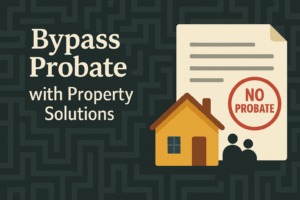Probate is the legal process of administering a deceased person’s estate, and when property is involved, it can become especially time-consuming and costly.
Many property owners aim to avoid probate with property to ensure a smoother, faster, and more private transfer of assets to their loved ones.
Delays in accessing inherited property, unexpected legal fees, and public court involvement are just a few of the reasons people look for alternatives.
Fortunately, there are effective ways to avoid probate with property if you plan ahead.
In this article, we’ll explore key strategies and answer important questions, including:
- Is probate necessary for property owners?
- What Is Non-Probate Property?
- Should you gift a house or place it in a trust?
- How do you write a will to avoid probate?
- How long can a house stay in a deceased person’s name?
If you are looking to invest as an expat or high-net-worth individual, which is what I specialize in, you can email me (hello@adamfayed.com) or WhatsApp (+44-7393-450-837).
This includes if you are looking for a free expat portfolio review service to optimize your investments and identify growth prospects.
Some facts might change from the time of writing. Nothing written here is financial, legal, tax, or any kind of individual advice, nor is it a solicitation to invest or a recommendation of any specific product or service.

What makes probate necessary for property owners?
For property owners, probate matters because:
- Real estate cannot be sold or transferred until probate is complete, which can take months or even years depending on the complexity of the estate and local laws.
- Court and legal fees can significantly reduce the value of the inheritance passed on to beneficiaries.
- Probate is public, meaning ownership and estate details become part of the public record, which some families may want to avoid.
Planning ahead allows you to structure your property ownership and estate in a way that minimizes or bypasses probate entirely, helping your heirs receive assets faster, with fewer costs and less red tape.
Non-probate property meaning
Non-probate property refers to assets that pass directly to a beneficiary or co-owner upon your death, without needing to go through the probate court.
These assets are set up in a way that they legally transfer ownership automatically, bypassing the delays, expenses, and public nature of the probate process.
Key Characteristics of Non-Probate Property:
- Ownership arrangements or legal designations determine who inherits.
- These assets are not controlled by your will.
- They avoid probate as long as documentation is clear and up to date.
What Is the Best Way to Pass Property to Heirs Without Probate?

Several legal tools, like joint tenancy and trusts, can help transfer real estate directly to heirs, bypassing the court system entirely.
Here are the most effective strategies:
1. Joint Ownership with Rights of Survivorship (Joint Tenancy)
- Two or more people co-own a property. When one owner dies, their share automatically transfers to the surviving owner(s), outside of probate.
- Pros:
- Simple and automatic transfer.
- No need for a will or court process for that asset.
- Cons:
- The surviving owner gains full control, which may not align with your broader estate plans.
- Creditors of the co-owner can affect the asset during their lifetime.
2. Transfer-on-Death (TOD) or Beneficiary Deeds
- In jurisdictions that allow it, a TOD deed lets you name a beneficiary who will automatically inherit the property upon your death.
- Pros:
- Retain full ownership and control during your lifetime.
- Avoids probate and allows direct transfer.
- Cons:
- Not available in every country or region.
- Must be properly recorded and updated if circumstances change.
3. Revocable Living Trust
- You place the property into a trust that you control during your lifetime. Upon your death, a successor trustee transfers the property to your chosen beneficiaries.
- Pros:
- Avoids probate completely.
- Provides flexibility, control, and privacy.
- Can include multiple properties or complex assets.
- Cons:
- Requires more setup and possible legal fees.
- Needs active maintenance and proper titling of assets.
Each method has its benefits depending on your personal situation, jurisdiction, and long-term estate goals.
What Is the Best Way to Leave a House to Someone?
There’s no one-size-fits-all answer when it comes to leaving a house to a loved one, but some methods are clearly better than others if your goal is to avoid probate and ensure a smooth transfer.
Here’s how the main options compare:
1. Leaving a House in a Will: You specify in your will who should inherit the house.
- Pros:
- Simple to draft and update.
- Maintains full control during your lifetime.
- Cons:
- The property must go through probate, which can delay transfer and increase costs.
- Public process that may expose your estate to scrutiny or disputes.
2. Putting the House in a Revocable Living Trust: You transfer the title of the house into a trust, with instructions for what happens upon your death.
- Pros:
- Completely avoids probate.
- You keep control while alive and mentally competent.
- Offers privacy and can be structured for multiple beneficiaries or contingencies.
- Cons:
- Requires upfront setup and correct titling.
- May involve legal fees and ongoing administration.
3. Deed Transfer (During Lifetime): You transfer ownership while still alive, either as a gift, through joint tenancy, or via a Transfer-on-Death (TOD) deed (if available in your region).
- Pros:
- Immediate transfer or clear succession plan in place.
- Bypasses probate if structured correctly.
- Cons:
- Gifting may trigger tax consequences.
- You may lose control over the property.
- Risk of complications if your beneficiary has financial or legal issues.
Is it better to gift a house or put it in a trust?
If preserving control, minimizing tax burdens, and ensuring a smooth inheritance are priorities, placing the house in a trust is generally the more strategic path.
Both gifting a house and placing it in a trust can help avoid probate, but the long-term implications are significantly different, especially when it comes to tax exposure, control, and legacy planning.
In many jurisdictions, the recipient inherits your original cost basis in the property.
This means that if they sell the house later, they could face a large capital gains tax bill based on the difference between your purchase price and the sale price.
Additionally, once the house is gifted, you give up ownership rights and any say over what happens to the property.
In contrast, placing a property in a revocable living trust allows you to retain control over it during your lifetime while ensuring it passes directly to your chosen beneficiaries after death without probate.
Trusts also often come with tax advantages, such as a step-up in cost basis at death, which can significantly reduce capital gains liability for your heirs.
From an estate planning perspective, trusts tend to offer more flexibility, privacy, and protection.
They’re especially valuable if you have multiple properties, complex family dynamics, or international ties.
Gifting, while simpler on the surface, may expose your family to unnecessary costs and complications later.
Ultimately, the better option depends on your goals.
How Long Can a House Stay in a Deceased Person’s Name?
When a property owner dies and no action is taken to transfer the title, the house can technically remain in the deceased person’s name for months or even years.
However, this creates legal and financial risks that should be avoided.
Until the property is retitled, heirs or executors may face challenges:
- Inability to sell or refinance the home, since only someone with legal ownership can authorize such actions.
- Accumulating liabilities like unpaid taxes, maintenance costs, or insurance lapses.
- Increased risk of disputes among beneficiaries or other interested parties.
In some cases, especially where probate is delayed or contested, the house may sit in legal limbo for an extended period; sometimes indefinitely if no heirs step forward or documents are missing.
How Do You Write a Will to Avoid Probate?
Many people assume that simply having a will is enough to avoid probate, but that’s a common misconception.
In reality, a will must go through the probate process to be validated by a court before any assets it governs can be distributed.
That said, your will can still play a crucial role in a broader estate plan that minimizes probate.
To support probate-avoidance strategies, your will should be carefully drafted to complement non-probate tools like trusts, joint ownership, and beneficiary designations.
Additionally, you should ensure your will does not create conflicts.
If your will names a different beneficiary than what’s listed on a property deed or insurance policy, the deed or policy usually takes precedence.
Misalignment can lead to disputes and delays.
Key tips:
- Use your will to cover only assets that haven’t been placed in a trust or given a clear transfer mechanism.
- Include a “pour-over” clause if you have a trust, directing any remaining assets into it.
- Coordinate with an estate planning professional to align all elements of your estate—wills, trusts, deeds, and financial accounts.
A will alone can’t avoid probate, but a properly written one can support a smart, integrated strategy to minimize it.
Why Should You Have a Will If You Still Have to Go Through Probate?
Even if avoiding probate is your goal, having a will remains a critical part of any estate plan. When probate is unavoidable, a will ensures that your wishes are legally documented and followed through the process.
A will provides clear instructions for how your remaining assets should be distributed.
It also names an executor to manage your estate, which can prevent unnecessary confusion or disputes among family members.
Without a valid will, the state decides who inherits under intestacy laws, which might not reflect your true intentions.
Even if most of your property is classified as non-probate (like assets held in joint tenancy, a trust, or with named beneficiaries), a will acts as a safety net.
For example, if you forget to update a deed or title, or acquire new property late in life that isn’t retitled into your trust, your will can ensure those assets are not left in legal limbo.
Final Thoughts: How to Avoid Probate with Property Efficiently
Avoiding probate with property isn’t just about saving time and money—it’s about ensuring your wishes are carried out smoothly.
Tools like revocable living trusts, joint ownership with rights of survivorship, and transfer-on-death (TOD) deeds can help keep your property out of court and in the hands of your heirs.
The key is early, proactive planning.
Every jurisdiction has its own legal nuances, so working with an experienced estate planning professional is essential to get it right.
By taking the right steps now, you can protect your legacy and give your loved ones peace of mind.
Pained by financial indecision?

Adam is an internationally recognised author on financial matters with over 830million answer views on Quora, a widely sold book on Amazon, and a contributor on Forbes.



